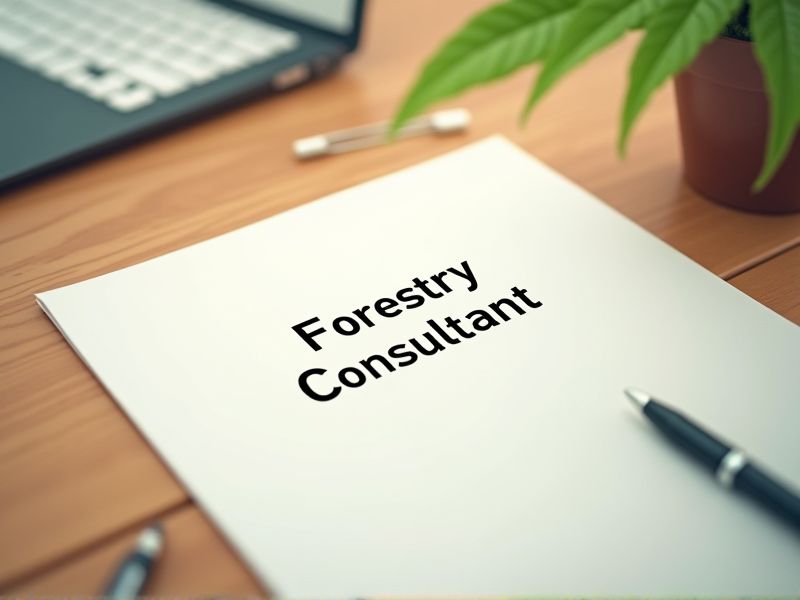
Forestry consultants are responsible for advising and implementing sustainable management of forest lands, which necessitates a thorough understanding of ecological principles and forestry techniques. Without the proper certifications, a consultant might lack the credibility or knowledge needed to advise landowners on legal, environmental, and economic aspects of forest management. Certifications often act as a benchmark for professional competence, ensuring consultants can effectively balance forest conservation with commercial activities. Consider obtaining these key certifications to strengthen your expertise as a Forestry Consultant.
Certified Forester (CF)
A Certified Forester (CF) ensures adherence to ethical and professional standards in forest management, directly enhancing the credibility of a forestry consultant. Their expertise leads to sustainable practices, positively impacting ecosystem health and resource management. Certification equips consultants with updated knowledge, resulting in informed decision-making aimed at optimizing forest productivity. Employing a CF can improve stakeholder confidence, as clients increasingly demand evidence of qualifications and accountability in environmental services.
Registered Forester (RF)
A Registered Forester provides expertise in sustainable management practices that ensure long-term health of forest ecosystems. Their involvement aids in compliance with environmental regulations, minimizing legal and financial risks for clients. They assess timber value accurately, optimizing economic returns for landowners. RF's guidance improves habitat conservation, balancing biodiversity with resource utilization.
Sustainable Forestry Management Certificate
Sustainable forestry management certificates are vital for forestry consultants because they ensure adherence to environmentally responsible practices that maintain biodiversity. Achieving certification demonstrates a consultant's commitment to legal and ethical standards, attracting clients who prioritize sustainability. Certification enhances a consultant's credibility and opens up opportunities within markets increasingly demanding sustainable timber and forest products. Globally acknowledged certification standards help align a consultant's practices with international trade requirements, facilitating smoother cross-border operations.
Forest Stewardship Council (FSC) Professional Certification
Forest Stewardship Council (FSC) Professional Certification ensures forestry consultants adhere to globally recognized standards for sustainable forest management. Certification often results in improved forest health, increasing biodiversity and ecosystem resilience. Consultants with FSC certification typically gain enhanced credibility, often leading to increased trust among stakeholders and clients. In markets increasingly conscious of sustainability, FSC certification can help consultants access new opportunities and achieve competitive differentiation.
LEED Accredited Professional (LEED AP)
A LEED Accredited Professional brings specialized knowledge in sustainable practices, aligning forestry consulting with eco-friendly standards. Certification enhances a consultant's credibility, attracting clients who prioritize sustainable forestry management. LEED APs contribute to optimizing resource use and environmental conservation in forestry projects. This expertise aids in meeting regulatory compliance, further ensuring project success and sustainability.
Certified Environmental Professional (CEP)
A Certified Environmental Professional (CEP) ensures adherence to environmental regulations, which minimizes legal risks for forestry operations. Possessing a CEP designation typically indicates expertise in sustainable practices, promoting long-term ecosystem health. Their role facilitates informed decision-making that helps balance economic objectives with environmental stewardship. Companies and clients increasingly demand such credentials to meet rising public and market expectations for sustainable forestry management.
GIS Professional (GISP) Certification
The GIS Professional (GISP) Certification enhances a Forestry Consultant's credibility by demonstrating expert knowledge in geospatial data management. Accurate spatial analysis of forest ecosystems relies heavily on advanced GIS skills, ensuring informed decision-making and policy development. Certification provides a competitive advantage by confirming proficiency in the latest GIS technologies and methodologies specific to forestry needs. Clients and employers often prefer certified professionals, as they tend to deliver more reliable and efficient project outcomes.
Wildlife Habitat Management Certification
Wildlife Habitat Management Certification enhances a forestry consultant's ability to integrate wildlife conservation into forest management plans, meeting ecosystem sustainability goals. This certification validates the consultant's expertise, increasing client trust and potentially leading to more project opportunities. Understanding wildlife dynamics helps consultants mitigate biodiversity loss, aligning with environmental regulations and policies. Certification may facilitate partnerships with conservation organizations seeking collaborators for holistic land stewardship.
Forest Inventory Analyst Certification
The Forest Inventory Analyst Certification provides forestry consultants with validated skills in assessing forest resources accurately, facilitating data-driven decision-making. Clients often demand certified analysts to ensure that forest plans are reliable and follow industry standards due to the accuracy and credibility certification guarantees. This certification demonstrates commitment to professional development, potentially increasing employability and client trust. Certified analysts often identify cost-effective and sustainable forestry management strategies, benefiting both clients and the environment.
Environmental Impact Assessment Certification
Environmental Impact Assessment (EIA) Certification provides forestry consultants with the tools to evaluate potential environmental consequences of forestry practices. By holding this certification, consultants ensure compliance with environmental regulations, minimizing the risk of legal issues for their clients. Access to an EIA framework allows for better-informed decision-making, leading to sustainable forest management and conservation. Clients are more likely to trust and engage consultants who demonstrate expertise and commitment to environmental stewardship.
Summary
By obtaining certifications, you can enhance your professional credibility and open up more career opportunities as a Forestry Consultant. Certified consultants often command higher fees due to their proven expertise. Certifications typically lead to better project management skills and contribute to more sustainable forestry practices. As you gain recognition, your network within the industry is likely to expand, offering further growth and collaboration chances.
